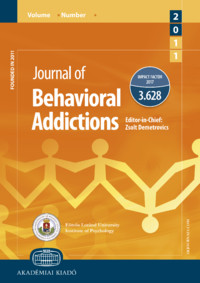Internet addiction and psychological distress among Chinese schoolchildren before and during the COVID-19 outbreak: A latent class analysis
Internet addiction and psychological distress among Chinese schoolchildren before and during the COVID-19 outbreak: A latent class analysis
Author(s): I-Hua Chen, Chao-Ying Chen, Chieh-hsiu Liu, Daniel Kwasi Ahorsu, Mark D. Griffiths, Yu-Pin Chen, Yi-Jie Kuo, Chung-Ying Lin, Amir H. Pakpour, Shu-Mei WangSubject(s): Behaviorism
Published by: Akadémiai Kiadó
Keywords: COVID-19; problematic gaming; problematic social media use; problematic smartphone use; psychological distress
Summary/Abstract: Background and aims. The present longitudinal study examined the changes in problematic internet use (problematic smartphone use, problematic social media use, and problematic gaming) and changes in COVID-19-related psychological distress (fear of COVID-19 and worry concerning COVID-19) across three time-points (before the COVID-19 outbreak, during the initial stages of the COVID-19 outbreak, and during the COVID-19 outbreak recovery period). Methods. A total of 504 Chinese schoolchildren completed measures concerning problematic internet use and psychological distress across three time-points. Latent class analysis (LCA) was used to classify participants into three groups of problematic internet use comprising Group 1 (lowest level), Group 2 (moderate level), and Group 3 (highest level). Results. Statistical analyses showed that as problematic use of internet-related activities declined among Group 3 participants across the three time points, participants in Group 1 and Group 2 had increased problematic use of internet-related activities. Although there was no between-group difference in relation to worrying concerning COVID-19 infection, Groups 2 and 3 had significantly higher levels of fear of COVID-19 than Group 1 during the COVID-19 recovery period. Regression analysis showed that change in problematic internet use predicted fear of COVID-19 during the recovery period. Conclusion. The varied levels of problematic internet use among schoolchildren reflect different changing trends of additive behaviors during COVID-19 outbreak and recovery periods.
Journal: Journal of Behavioral Addictions
- Issue Year: 10/2021
- Issue No: 3
- Page Range: 731-746
- Page Count: 16
- Language: English

